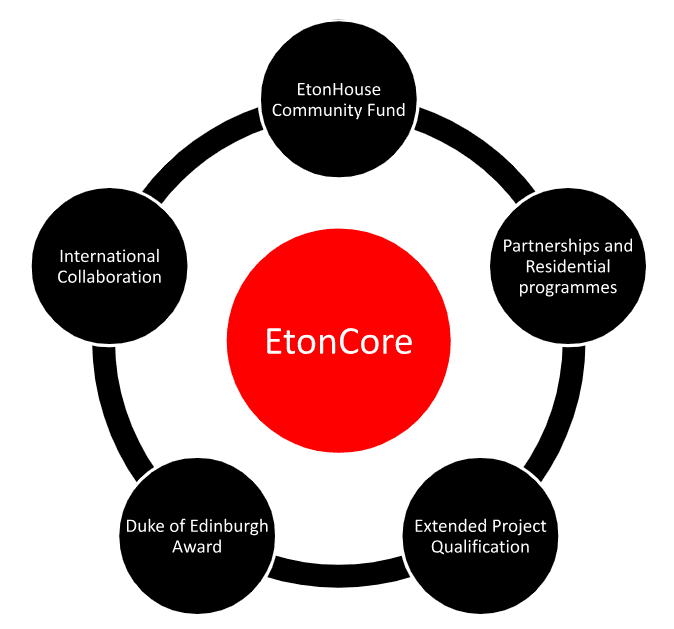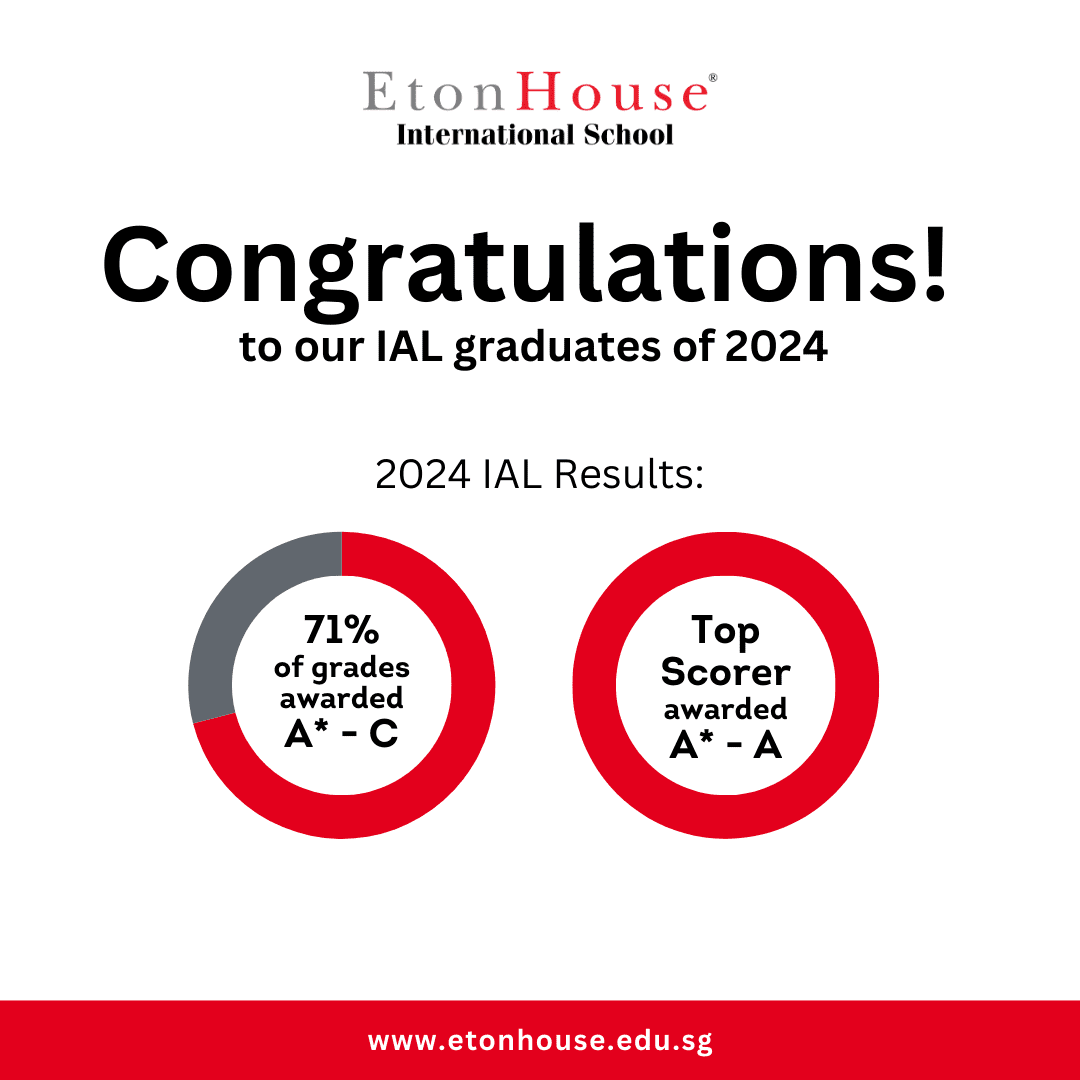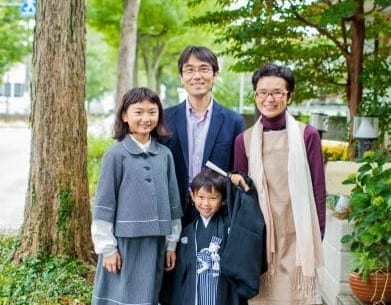The High School (Sixth Form) Programme at EtonHouse International School Orchard is designed to prepare our students for the increased expectations of universities and employers. Besides good grades, students are expected to develop as confident young adults who can take responsibility, be accountable, develop high- levels of self-esteem and confidence, and have the ability to set and meet personal targets. Personalised support and guidance will be given to each individual student. They, in turn, will be expected to develop a range of skills and experiences they will need for Higher Education and employment.
The High School (Sixth Form) Programme in Years 12 to 13 for students aged 16 to 18 comprises the internationally recognised International A-Levels, alongside the bespoke EtonCore, Lifeskills course and Physical Education programmes that ensures our students leave us equipped to access leading universities as confident and capable global citizens.
High School (Sixth Form) Programme Information Booklet
International A-Levels (IAL)
International A-Levels are qualifications offered to students ages 16 to 18 at international schools globally by Cambridge International Examinations and Pearson Edexcel. They are internationally recognised qualifications equivalent to British A-Levels, the standardised academic examinations taken in the United Kingdom. Both qualifications are highly respected by universities and employers alike and provide a direct path to university. Thousands of learners worldwide gain places at leading universities every year with International A-Levels.
How International A-Levels provides students with even greater opportunities for success:
- IAL only require students to choose 3 or 4 subjects to specialise in and study in depth over two years. Students can choose to study and focus on the subjects that interest them and which are required for the degree they intend to pursue at university (most university entry requirements specify only three grades at A-Level). They are also likely to maximise their potential and achieve the best outcomes/grades in these subjects by specialising earlier.
- Students do not have to sit the final examinations all at once and can instead space them out. Students will sit for the AS exams at the end of their first year (Year 12) and receive an AS-Level grade which can also be a stand-alone qualification in its own right that is worth half the equivalent A-Level grade. Students may then decide which subjects to continue into the second year (Year 13) and take the A2 exams, which test on the content covered in the second year, at the end of the year. The final A-Level grade will be an average of the grades achieved in the AS and A2 exams.

- There are two examination periods within the year. At EtonHouse Orchard, students will take their exams in May/June and would have the flexibility to resit and retake modules in October/November if necessary, ensuring they get the best result possible to get them into their dream university.
- Complementing their IAL subject choices, students would also have more non-teaching and self-directed time for the EtonCore, Lifeskills course and Physical Education programmes. These programmes are designed to enrich students’ Sixth Form life and encourage them to become active, compassionate and lifelong learners. It would also help them build a comprehensive and meaningful CV that would benefit university admissions and future employment.
The advantages of studying International A-Levels at EtonHouse Orchard
- Personalised Pathway Plan@16
The Personalised Pathway Plan@16 is an individual action plan following discussions and interviews in Year 11 between the student and key staff to identify the most appropriate International A-Level courses to maximise academic potential whilst also supporting personal development. These discussions include conversations connected to the student’s career aspirations and advice by experienced teachers enables them to make informed and appropriate subject choice decisions. Each individual will also be provided with opportunities outside the classroom to challenge themselves, promote independence and nurture talents. This holistic and student-led approach is unique to our school, made possible due to our boutique size, rich teacher-to-student ratio and mantra that ‘every student is known well by every teacher’.
At EtonHouse International School Orchard, we recognise the importance of providing students with a holistic education that goes beyond academics. This is supported through the bespoke EtonCore programme, which is a combination of elective and accredited pathways and is an integral part of our Personalised Pathway Plan@16. Each student will be able to select an individualised and personalised journey comprising elective aspects of the EtonCore where they will have opportunities to develop their interests and nurture student agency and a growth mindset.
These elements include:
- Researching and producing an essay on a self-selected topic as part of the externally accredited Extended Project Qualification;
- Driving community service projects through the EtonHouse Community Fund;
- Working towards the Duke of Edinburgh Award, a globally recognised accreditation that empowers young people to learn and grow through the areas of physical recreation, skills development, adventurous journey and voluntary service;
- Participating in partnerships and residential programmes that give them real-world experiences;
- Collaborating with other overseas schools in the EtonHouse global network to develop international mindedness

The EtonCore programme encourages students to become well-principled, critical thinkers who are not afraid to take risks, and it is in line with the EtonHouse core values of nurturing independent learners who take responsibility for their future success. These attributes challenge students to think beyond subject-based learning outcomes and are fundamental for helping them prepare for higher education and future career opportunities.
The structured Lifeskills programme includes a range of sessions led by experienced teachers and guest speakers on subjects such as study skills, applying for university, university life, wellbeing, finance, and relationships. The aim of this programme is to strengthen students’ understanding of how to build and maintain emotional, physical, and mental wellbeing when studying for their IAL and start preparing for life after High School (Sixth Form). Maintaining a healthy balance between academic studies and developing a personal life is even more important in these years to support the wellbeing of young people as they approach adulthood.
- University Guidance and Careers
Our student-centred university and careers guidance programme offers personalised support that puts the student firmly at the forefront of the decision-making process. Experienced teachers conduct workshops, talks and discussions to support the Year 12 and 13 students and their families with their decision-making as well as advising on course requirements and steering university research. They work closely with each student to create a balanced university list, write their personal statements and essays and prepare for interviews. With support and guidance, students are encouraged to take ownership of their research and planning process to find their best fit institution or career pathway.
Comparing International A-Levels with other post-16 qualifications:
- Difference between International A-Levels and British A-Levels?
British A-Levels and International A-Levels are both qualifications that students can take in order to further their education and access universities all over the world. However, there are differences between the two. A-Levels are only offered in the United Kingdom and topics are often UK-centric. International A-Levels are offered globally by international schools and whilst the content of these courses is similar, the context in which they are placed is non-country specific and therefore are more suited and appropriate for an international context. However, both qualifications are highly respected by universities and employers alike, and provide a direct path to university.
- Difference between the IB and A-Levels (International/UK)?
Unlike the IB Diploma Programme, which focuses on breadth as students have to study six subjects alongside the core components; Extended Essay, Theory of Knowledge and CAS (Creativity, Activity and Service), IAL only require students to choose three or four subjects to specialise in and study in depth over the two years. Students can choose to study and focus on the subjects that interest them and which are required for the degree they intend to pursue at university (most university entry requirements specify only three grades at A-Level). They are also likely to maximise their potential and achieve the best outcomes/grades in these subjects by specialising earlier. Both programs are widely respected by universities and are seen as indicative of a student’s ability to handle the demands of higher education. Ultimately, which programme is the best fit for a student will depend on their academic interests, goals, and the specific requirements of the universities they are considering applying to.
EtonHouse International School, Orchard is proud to announce the outstanding results of our Year 13 cohort, for the International A-Levels for 2024. We are thrilled to share these impressive results as they are the best in the school’s history and are testament to the hard work and commitment of both students and teachers. Well done and congratulations to all involved.

For the list of EIS SSG permitted courses, please click here.






